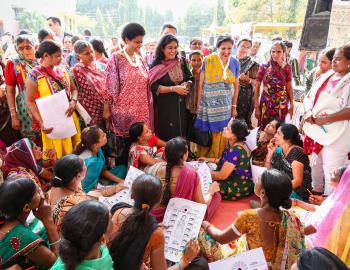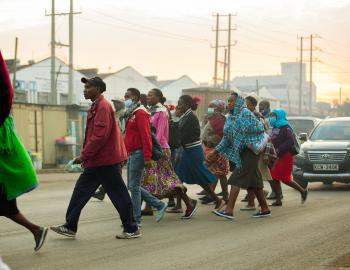POLICY BRIEF: Using climate information to achieve long-term development objectives for African ports (FCFA)
POLICY BRIEF: Using climate information to achieve long-term development objectives for African ports (FCFA)
Ports may be operational in a future climate that will be significantly different to the historical climate commonly used for planning and design. How will they withstand long-term changes in the climate and how can decision-makers ensure that port infrastructure is more resilient? A new policy brief for the Future Climate for Africa (FCFA) and CDKN explores the issues and solutions.
Authors George Woolhouse and Darren Lumbruso focus on port infrastructure in sub-Saharan Africa. They investigate the climate change risks to ports and how well climate information is currently used in planning and operations. They recommend a range of solutions that decision-makers could adopt to make African ports more climate-resilient.
Key messages
- Africa requires substantial investment in port infrastructure in the coming decades, to meet the demands of fast-growing maritime trade.
- Port infrastructure is designed for a lifetime of many decades and may be operational in a future climate that will be significantly different to the historical climate used for planning and design.
- Ports are highly vulnerable to climate-related impacts. Their location in often dynamic coastal environments places them at risk from storm surges, extreme waves, high winds and extreme rainfall.
- A close dialogue is needed between climate scientists and the port industry to translate awareness of climate risks into practical actions to reduce those risks.
Future Climate for Africa (FCFA), is a new five-year international research programme that aims to advance scientific knowledge about the future of Africa’s climate in the next generation – and how climate science could be better used by decision-makers.
FCFA is jointly funded by the UK’s Department for International Development (DFID) and the Natural Environment Research Council (NERC). CDKN is responsible for coordinating the FCFA scoping phase – an 18 month exercise uses six case studies in sub-Saharan Africa to evaluate the needs of science users in the context of the capabilities and limitations of current science.
Read the other FCFA case studies:
- Using climate information to achieve long-term development objectives in coastal Ghana and Mozambique
- Using climate information to achieve long-term development objectives in Zambia
- Using climate information to achieve long-term development objectives in Rwanda
- Using climate information to achieve long-term development objectives in Malawi
- Using climate information for large scale hydro-power planning in sub-Saharan Africa
More information is available at http://www.futureclimateafrica.org



